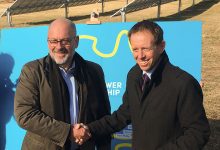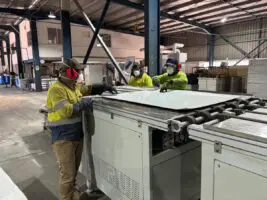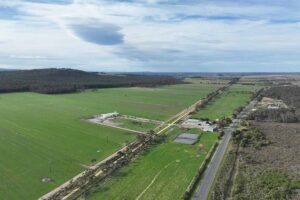ACT minister for climate change and energy Shane Rattenbury has slammed the Federal Government for its lack of action on climate change, saying that it must come to the table to work with states and territories on policies that can seize the economic opportunities that clean energy can provide.
“In the Alice in Wonderland-like world that is climate policy in Australia, the Federal Government says we’ll reach our Paris targets in a canter when the evidence shows the opposite,” Rattenbury told the Australia Energy Week conference in Melbourne.
“It talks about building new coal-fired power, when the economics show this would be irrational; it entertains the idea of building nuclear power, when we have cleaner, cheaper, renewable energy solutions right under our noses,” he said.
“I’m going to be blunt about it, because it doesn’t help anyone to mince words. Human-induced climate change is cooking the planet. We’re at risk of ecological and societal collapse. This is not some green hyperbole; this is the analysis of the world’s scientific community.”
Rattenbury told the conference that the Federal Government needed to pull its weight in establishing effective policies to support investment in new energy infrastructure, citing the looming closure of the Liddell power station, along with up to 11,000MW of capacity slated for closure by 2037.
Rattenbury’s comments came as other key players in the industry have also expressed their frustration over the lack of any clear policy from the federal government.
Kerry Schott, the chair of the Energy Security Board, also lamented the lack of cohesion in energy policy, saying there were yawning gaps that were affecting investment and consumers, and was leaving reliability in a critical state, despite the best efforts of the key institutions.
Reflecting on the status of the National Energy Market, Schott rated criteria such as the level of ‘affordability and satisfied customers’ and the state of governance within the market, as being in critical condition, but was optimistic that they may improve in future.
In his speech, Rattenbury called on Federal energy minister Angus Taylor to set a proactive agenda for the COAG Energy Council, saying that the minister cannot continue to stymie the work of the council, particularly when States and territories have come to the table to negotiate a workable policy.
Under previous energy minister Josh Frydenberg, the Federal coalition government has used the COAG Energy Council has the primary forum for prosecuting the development of a national energy policy. The process ended with the ill-fated National Energy Guarantee, but there are fears that progress may stymie under Taylor.
“COAG needs to step up to its responsibilities and lead the reform agenda that energy customers are demanding,” Rattenbury said.
“Let me simply conclude by reflecting on the fact that climate change and emissions reduction has sadly proven an intractable issue for the Federal Government, and that has flowed into the effectiveness of the Energy Council.”
“We simply cannot afford for this to continue. The Federal Government needs to shoulder its responsibilities as Chair of the Energy Council to set a positive and proactive agenda.”
The call from the ACT energy minister echoes similar calls from NSW energy minister Matt Kean, who told a meeting of CEDA members that the Federal Government must work with the states on energy policy.
Rattenbury said strong investments in renewable energy will not only help avoid significant costs due to the impacts of climate change; it will also deliver substantial economic opportunities.
“The potential damages from climate change to Australia at current global emissions patterns are conservatively quantified at $584 Billion in 2030 and $762 Billion in 2050.” Rattenbury said.
Importantly, the analysis showed that developing clean economies and tackling climate change will deliver economic benefits. Transitioning to a low-carbon economy is a sound strategic objective generating benefits that significantly outweigh the costs.”
The ACT has made ambitious investments in renewable energy projects to supply power to the national capital. The ACT will become the first Australian state or territory to source 100% of its electricity from renewable energy in October, and has set a goal of achieving zero-net emissions by 2045.
The ACT conducted several reverse auction initiatives to secure contracts for the construction of new solar and wind farms, to supply the ACT will all of its electricity needs from renewable sources. The ACT has also invested in shifting some of its energy use onto the electricity system, including the completion of a light rail system in April, as a measure that will help reduce transport emissions in the capital.
“In the ACT we will be powered by 100 per cent renewable electricity from 2020 onwards, demonstrating pathway towards a low cost, zero carbon future,” Rattenbury said.
“We were the first in the nation to use reverse auctions to procure the renewable generation needed for our 100 per cent renewable electricity target.”
The ACT has also served as an ideal test-bed for emerging clean energy technologies, and now boasts a virtual power plant with over 700 participating households, providing 2MW of dispatchable residential storage in the ACT, based on a platform developed by Canberra-firm Reposit Power. The ACT hopes to grow this to up to 5,000 residential battery systems, providing 36MW of dispatchable capacity.
The ACT Legislative Assembly became the first State or Territory to make a formal declaration of a climate change emergency in May.
“[The assembly] condemns the federal government for its continued failure to enact effective climate change policy, and requests the federal government provide additional funding for states and territories to deal with worsening climate change risks and impacts,” the motion said.








